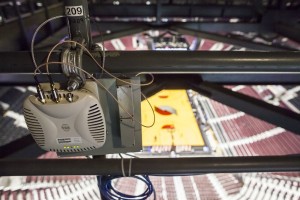Though the headline of the HP release pegs the reason behind the deal as the desire to “create an industry leader in enterprise mobility,” the acquisition will likely cause a lot of business activity in our corner of the world, namely wireless network deployments for large public venues, like stadiums. Over the past year, Aruba has been making a name for itself with high-profile Wi-Fi deployments in venues like the San Francisco 49ers’ new Levi’s Stadium, Texas A&M University’s Kyle Field, and the Dallas Mavericks’ American Airlines Center, among others. Perhaps the most interesting question from a business perspective is whether being part of HP will help or hurt Aruba when it comes to making stadium deals, and whether or not using HP core networking gear will become a required (or preferred) part of prospective stadium Wi-Fi deals.
On a business-wide view, the second $3 billion acquisition this year in the DAS/Wi-Fi space (following CommScope’s $3 billion purchase of DAS and networking supplier TE Connectivity) is perhaps a signal that consolidation is upon us in the greater Wi-Fi and local networking marketplace. Though we didn’t know exactly how and when such deals would shake out, on one hand it’s not that much of a surprise to us since we have always believed that the stadium networking market is really just a precursor to what will eventually happen in other large public venues as well as in large public places like cities and towns: Wi-Fi, which already carries more wireless data than cellular, will continue to expand and appear in more places, generating new business ideas like Wi-Fi phones and Wi-Fi first wireless plans.
The appearance of IBM as a strong entrant in the stadium wireless space can also be looked at as another signal that bigger players are entering the market, which usually means that smaller players — like the Arubas of the world — get snapped up, like a star player being traded mid-year to a team seeking a championship. Cisco, which is no stranger to acquisitions, has been quiet of late, and we are noticing that telecom gear giant Ericsson is making more moves toward Wi-Fi, especially in the arena of small cells and the idea of bringing LTE to Wi-Fi frequencies. Sounds like the Wi-Fi market is moving up from the $10 tables into the green- and black-chip territory.
Who’s next in the Wi-Fi world as an acquisition target? The easy picks are players like Ruckus Wireless and Aerohive Networks, given their ability to conduct their own IPOs. But we’re also guessing there may be some digesting of other smaller concerns in the Wi-Fi DAS food chain as the bigger players seek to add skills, customers and technology via purchases. Stay tuned for what should be an exciting year in the enterprise and stadium Wi-Fi business arena.







